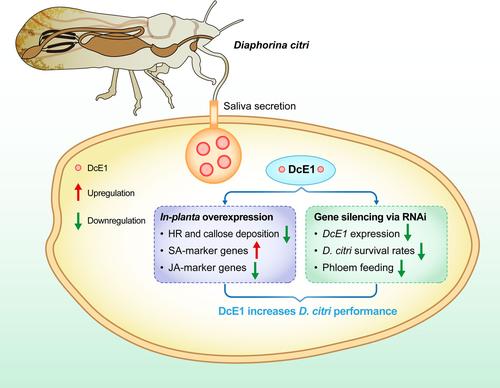当前位置:
X-MOL 学术
›
Pest Manag. Sci.
›
论文详情
Our official English website, www.x-mol.net, welcomes your
feedback! (Note: you will need to create a separate account there.)
Salivary effector DcE1 suppresses plant defense and facilitates the successful feeding of Asian citrus psyllid, Diaphorina citri
Pest Management Science ( IF 3.8 ) Pub Date : 2024-11-15 , DOI: 10.1002/ps.8536 Yinhui Kuang, Chaozhi Shangguan, Chuyang Wang, Liwei Gao, Xiudao Yu
Pest Management Science ( IF 3.8 ) Pub Date : 2024-11-15 , DOI: 10.1002/ps.8536 Yinhui Kuang, Chaozhi Shangguan, Chuyang Wang, Liwei Gao, Xiudao Yu

|
BACKGROUNDPiercing‐sucking insects secrete diverse repertoires of effectors into their hosts to weaken host defenses and promote infestation. The Asian citrus psyllid, Diaphorina citri Kuwayama, is the most destructive insect pest in citrus orchards because of its role as a vector for the huanglongbing pathogen, Candidatus Liberibacter asiaticus (C Las). However, specific effector proteins and their functions in D. citri remain unclear.RESULTSWe demonstrate that DcE1 , a salivary protein gene from D. citri , is predominantly expressed in the salivary gland tissues and is delivered into host plants during feeding. Transient expression in tobacco leaves revealed that DcE1 was subcellularly localized in the cytoplasm and plasma membrane, where it inhibited BAX ‐ and INF1 ‐induced cell death, suppressed callose deposition, and activated the salicylic acid pathway by upregulating the expression of endo‐β‐1,3‐glucanase NtBGL2 and regulatory protein NtNPR1 . Further, DcE1 knockdown by double‐stranded RNA (dsRNA) injection decreased the survival rates of D. citri and interrupted D. citri phloem‐feeding on host plants.CONCLUSIONThese results indicate that DcE1 is a novel effector that promotes plant susceptibility and enables D. citri feeding. These findings enhance our understanding of D. citri –plant interactions and offer a potential new target gene for the development of citrus protection strategies. © 2024 Society of Chemical Industry.
中文翻译:

唾液效应子 DcE1 抑制植物防御并促进亚洲柑橘木虱 Diaphorina citri 的成功喂养
背景吸食昆虫向宿主分泌各种效应器,以削弱宿主防御并促进感染。亚洲柑橘木虱 Diaphorina citri Kuwayama 是柑橘园中最具破坏性的害虫,因为它是黄龙病原菌 Candidatus Liberibacter asiaticus (CLas) 的载体。然而,特异性效应蛋白及其在 D. citri 中的功能仍不清楚。结果我们证明 DcE1 是来自柠檬石栎的唾液蛋白基因,主要在唾液腺组织中表达,并在摄食过程中输送到寄主植物中。在烟叶中的瞬时表达表明,DcE1 位于细胞质和质膜的亚细胞中,它抑制 BAX 和 INF1 诱导的细胞死亡,抑制胼胝质沉积,并通过上调内β-1,3-葡聚糖酶 NtBGL2 和调节蛋白 NtNPR1 的表达来激活水杨酸途径。此外,通过双链 RNA (dsRNA) 注射敲低 DcE1 降低了柑橘石桦的存活率,并中断了柑橘石栎根皮部对寄主植物的摄食。结论结果表明,DcE1 是一种促进植物易感性并使柑橘石桐取食的新型效应子。这些发现增强了我们对柑橘果木-植物相互作用的理解,并为柑橘保护策略的开发提供了一个潜在的新靶基因。© 2024 化工学会.
更新日期:2024-11-15
中文翻译:

唾液效应子 DcE1 抑制植物防御并促进亚洲柑橘木虱 Diaphorina citri 的成功喂养
背景吸食昆虫向宿主分泌各种效应器,以削弱宿主防御并促进感染。亚洲柑橘木虱 Diaphorina citri Kuwayama 是柑橘园中最具破坏性的害虫,因为它是黄龙病原菌 Candidatus Liberibacter asiaticus (CLas) 的载体。然而,特异性效应蛋白及其在 D. citri 中的功能仍不清楚。结果我们证明 DcE1 是来自柠檬石栎的唾液蛋白基因,主要在唾液腺组织中表达,并在摄食过程中输送到寄主植物中。在烟叶中的瞬时表达表明,DcE1 位于细胞质和质膜的亚细胞中,它抑制 BAX 和 INF1 诱导的细胞死亡,抑制胼胝质沉积,并通过上调内β-1,3-葡聚糖酶 NtBGL2 和调节蛋白 NtNPR1 的表达来激活水杨酸途径。此外,通过双链 RNA (dsRNA) 注射敲低 DcE1 降低了柑橘石桦的存活率,并中断了柑橘石栎根皮部对寄主植物的摄食。结论结果表明,DcE1 是一种促进植物易感性并使柑橘石桐取食的新型效应子。这些发现增强了我们对柑橘果木-植物相互作用的理解,并为柑橘保护策略的开发提供了一个潜在的新靶基因。© 2024 化工学会.


















































 京公网安备 11010802027423号
京公网安备 11010802027423号